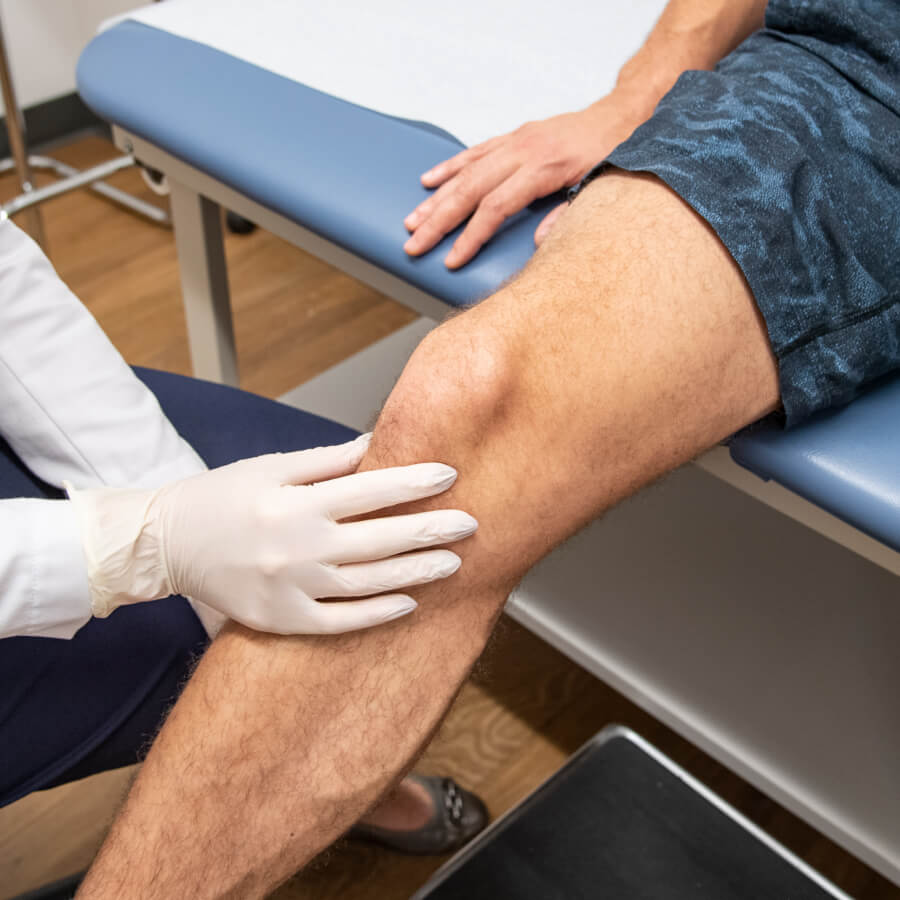What is a Baker’s Cyst?
A baker’s cyst is a type of cyst that can appear behind the knee. A cyst is a type of abnormal growth (one that is typically noncancerous). A cyst can be filled with either a semisolid substance (called synovial fluid) or a liquid, and it can cause you pain if it is left untreated. With this cyst, you may feel strain or tightness in the area the cyst has grown. The pain will likely worsen when you use your knee (e.g., usual usage, flexing, knee extension).
This type of cyst can also be called a popliteal cyst. If you suffer from arthritis or if there’s a tear in your cartilage, your knee may overproduce fluid, which can lead to a baker’s cyst.
Get Advanced Knee Care
Right In Your Neighborhood
Finding the treatment that’s right for your knee problem is our focus at The Orthopedic Health Center. We use non-surgical treatments whenever possible. When you do need surgery, our expert surgeons help you heal faster and with less pain. All right in your neighborhood: Hoboken and Jersey City.
Symptoms

A baker’s cyst is a slightly variable injury. It can sometimes cause pain, but other times, you might not even notice it. However, there are specific symptoms to keep an eye out for:
- An inability to flex the knee
- Stiffness in your knee joint
- Pain and swelling in your knee (and sometimes in your leg)
These symptoms might increase in severity if you’ve been using your knee extensively, if you’ve been standing for a long time, or if you’ve been active recently.
Even if you don’t believe you’re suffering from a baker’s cyst, you should contact a doctor if you’re experiencing any swelling or pain behind your knee. Sometimes, if you notice a bulge behind your knee, it might also be a sign of a more serious condition, which is why it’s in your best interest to have it examined if you have any concerns.
Causes and Risk Factors
Your knee – and all joint locations, to be more precise – is filled with a fluid called synovial. Synovial is a fluid that helps lubricate your knee by reducing the friction that you would otherwise feel when you move your knee. However, when the knee creates too much synovial fluid, it can build up and grow into a cyst.
Patients who suffer from arthritis or ailments that cause joint inflammation are more likely to grow this cyst. Additionally, if you are in an accident where the cartilage in your knee tears, your knee may begin to produce more fluid, which can lead to the build-up.
If a baker’s cyst is left untreated, the synovial fluid can filter into the surrounding areas, such as the calf. If the fluid ends up in the calf, you might experience swelling, a sharp pain, redness, or even feeling as if water is running down your leg.
A Minimally-Invasive Approach to Knee Repair
A common misconception is that you need a big, open surgery to fix your knee. We use modern, minimally-invasive procedures to avoid this path whenever possible – and many of our patients are up and walking by the next day.
Treatment
Once your orthopedic surgeon confirms that you have a baker’s cyst, there are some options they may recommend depending on the severity of the issue:
- Medication. Your doctor may recommend steroids to lower the amount of inflammation in the area. The cyst may still return, despite this.
- Draining the fluid. Your doctor may use a needle and drainage apparatus to remove the fluid from the area. They will use an ultrasound to make sure they get the fluid.
- Physical therapy. Physical therapy, alongside icing the area and using compression wraps, might help prevent the swelling and pain in the area. This can help lower the severity of the cyst.
- Surgery. Depending on the underlying problem and your response to non-surgical treatments, your doctor may recommend surgery to fix cartilage tears and osteoarthritis.
Takeaway
A baker’s cyst can cause pain and severely reduce the mobility of your knee. If this sounds like something you might be dealing with, our orthopedic surgeons are here to help! We have decades of experience treating all types of knee pain. Schedule your consultation in either Jersey City or Hoboken by contacting us today. Don’t wait!
Additional Resources
Appointments available now.
